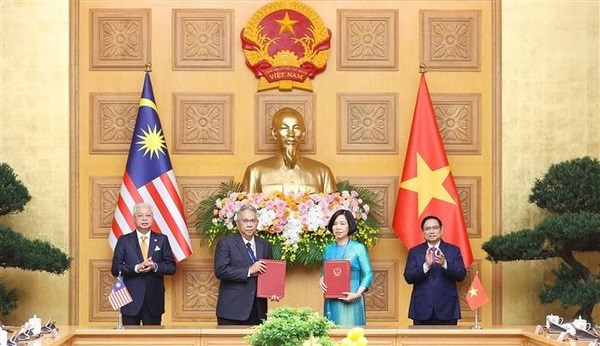
Malaysian Prime Minister Dato' Sri Ismail Sabri bin Yaakob and a high-ranking delegation of the Malaysian Government left Hanoi on March 22, successfully concluding their three-day official visit to Vietnam.
Malaysian Prime Minister Dato’ Sri Ismail Sabri bin Yaakob and a high-ranking delegation of the Malaysian Government left Hanoi on March 22, successfully concluding their three-day official visit to Vietnam.
 |
| Malaysian Prime Minister Dato’ Sri Ismail Sabri bin Yaakob (L) and Prime Minister Pham Minh Chinh. |
During the visit, the Malaysian PM held talks with Vietnamese Prime Minister Pham Minh Chinh, witnessed the signing of cooperation agreements between the two countries, and attended a banquet hosted by PM Chinh.
PM Ismail Sabri paid a courtesy call on Party General Secretary Nguyen Phu Trong, and met with President Nguyen Xuan Phuc and National Assembly Chairman Vuong Dinh Hue.
He received leaders of a number of Vietnamese businesses and met with the Malaysian community in Vietnam. A Vietnam-Malaysia joint press statement was also issued during the visit.
Accordingly, the leaders commended the strong and substantive development of the Strategic Partnership between the two countries. Both sides agreed to further strengthen political trust and develop the Vietnam - Malaysia Strategic Partnership in a deeper and more comprehensive manner ahead of the 50th founding anniversary of diplomatic relations in 2023.
Both sides affirmed their commitments towards deepening political and economic cooperation by promoting and conducting regular high-level meetings, strengthening existing bilateral cooperation mechanisms, notably the Joint Commission for Economic, Scientific and Technological Cooperation (JCM) and the Joint Trade Committee (JTC). Both sides agreed to continue working closely for the effective implementation of their signed agreements, including the Vietnam – Malaysia Plan of Action for the implementation of the Strategic Partnership for 2021 – 2025.
The leaders emphasised the importance of steadily promoting a strong, balanced and sustainable two-way trade, striving towards the target of 18 billion USD by 2025 with a view to having balanced trade between the two countries. In this regard, they agreed to explore ways to improve market access for key export products of both countries, including agricultural and aquatic products, Halal products, processed food, electronic components and products.
 |
| Malaysian Prime Minister Dato’ Sri Ismail Sabri bin Yaakob (L) and Prime Minister Pham Minh Chinh witness the signing of a cooperation agreement between the Vietnam News Agency (VNA) and Malaysian National News Agency (Bernama). |
Both sides agreed to further facilitate the expansion of investment in the two countries, particularly in high potential areas such as automation, smart logistics, innovation, high technology, digital economy, digital transformation. They expressed satisfaction with their defence and security cooperation and agreed to enhance information exchange and cooperation between the navy and coast guard forces of the two countries to effectively address emerging maritime issues. They concurred to strengthen maritime and ocean cooperation in the priority fields such as sustainable development of maritime economy, management of maritime resources and protection of the marine environment.
The leaders reiterated the importance of closer cooperation towards economic resilience and sustainable development in the post-pandemic period. Both sides agreed to accelerate negotiations for a new Agreement on Air Services and welcomed the early conclusion of the agreement on mutual recognition of COVID-19 vaccination certificates, which will facilitate the safe and regular commercial travel between both countries.
They also reiterated the Association of Southeast Asian Nations (ASEAN)’s consistent position on the East Sea and reaffirmed the importance of maintaining peace, security, stability, safety, and freedom of navigation and over-flight in and above the East Sea, and peaceful resolution of disputes without resorting to threat or use of force, in accordance with the universally recognised principles of international law, including the 1982 United Nations Convention on the Law of the Sea (UNCLOS). They called for the full and effective implementation of the Declaration on the Conduct of Parties in the East Sea (DOC) in its entirety, and were encouraged by the progress of the substantive negotiations towards the conclusion of an effective and substantive Code of Conduct in the East Sea (COC) in accordance with international law, including 1982 UNCLOS. They emphasised the need to maintain and promote an environment conducive to the COC negotiations.
PM Ismail Sabri highly appreciated the warm welcome and gracious hospitality reserved for the Malaysian delegation by the Leaders and the people of Vietnam during the visit. The Malaysian PM took this occasion to invite the leaders of Vietnam to visit Malaysia at the convenient opportunities.
The two PMs witnessed the exchange of a number of cooperation documents, including an MoU on recruitment, employment and repatriation of labourers, and another on legal cooperation between the Vietnamese and Malaysian governments, and a Letter of Intent expressing the intention to facilitate work towards the finalisation of a Memorandum of Understanding between the Institute of Diplomatic and Foreign Relations of Malaysia and the Diplomatic Academy of Vietnam on cooperation in the field of training diplomats. The PMs welcomed the signing of a cooperation agreement between the Vietnam News Agency (VNA) and Malaysian National News Agency (Bernama).
The official visit to Vietnam by Malaysian PM Ismail Sabri took place at a time when the Vietnam-Malaysia traditional friendship and strategic partnership have been thriving towards the 50th founding anniversary of diplomatic ties (1973-2023).
It aimed to further strengthen the bilateral relations and cooperation in the post-pandemic period. It also offers a chance for both sides to explore new aspects of bilateral ties, discuss regional and international issues of common concern, and promote bilateral trade and investment.
(Source: VNA)





